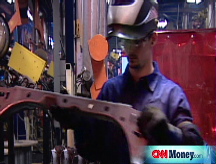Obama: No more pork
President-elect promises 'bang for the buck' spending on infrastructure, energy and education projects.
(CNN) -- President-elect Barack Obama issued a warning Sunday to officials around the country lining up for federal dollars to help projects take off in the struggling economy: No more business as usual.
In an interview on NBC's Meet the Press, Obama said, "What we need to do is examine: What are the projects where we're going to get the most bang for the buck? How are we going to make sure taxpayers are protected?
"You know, the days of just pork coming out of Congress as a strategy, those days are over."
Later, at a news conference in Chicago, Obama said that in his recent meetings with the National Conference of Governors, there was a "strong bipartisan" consensus that "we've got to get people working on some key projects that have been sitting there for a long time."
Infrastructure, energy programs, and school construction projects will get people working and ultimately help build a stronger economy, he said.
But, he added, "We are not going to simply write a bunch of checks and let them be spent without some very clear criteria as to how this money is going to benefit the overall economy and put people back to work. We're not going to be making decisions on projects simply based on politics and - and lobbying."
The president-elect faced questions about a possible bailout of the auto industry, which he supports with caveats.
"It makes no sense for us to shovel more money into the problem if you have not seen an auto industry that is committed to restructuring - restructuring that, frankly, should have been done 10 years ago, 20 years ago, 30 years ago," he told reporters.
He added, "Congress is doing the exact right thing by asking for a conditions-based assistance package that holds the auto industry's feet to the fire, gives them some short-term assistance, but also insists that that assistance leads to some very difficult choices involving all the stakeholders... including management, labor, shareholders, creditors, and so on."
Asked whether he supports Sen. Christopher Dodd's call Sunday for General Motors CEO Rick Wagoner to step down, Obama did not respond directly. But he said generally that "if this management team that's currently in place doesn't understand the urgency of the situation and is not willing to make the tough choices and adapt to these new circumstances, then they should go."
In the NBC interview, recorded Saturday, Obama slammed executive compensation packages in the industry as "out of line" compared to Japanese auto companies.
"Now, it's not unique to the auto industry. We have seen that across the board. Certainly we saw it on Wall Street," he said. "And part of what I'm hoping to introduce as the next president is a new ethic of responsibility."
Facing a financial crisis that is "going to get worse," Obama said his top priority is building a recovery plan "equal to the task." He gave no specifics, saying his economic team is "crunching the numbers."
Despite the nation's massive debt, Obama said he won't be focusing on building a balanced budget at the start of his administration.
"We understand that we've got to provide a blood infusion to the patient right now to make sure that the patient is stabilized. And that means that we can't worry short term about the deficit. We've got to make sure that the economic stimulus plan is large enough to get the economy moving," he said.
Part of that movement means taking big steps to fix the mortgage crisis, he said, adding that he is "disappointed that we haven't seen quicker movement" by the Bush administration on that front.
Asked whether he has "personally conveyed" that disappointment to the administration, Obama said only, "We have specifically said that, moving forward, we have to have a housing component to any actions that we take."
Throughout his campaign, Obama vowed to raise taxes on couples earning more than $250,000 and individuals making more than $200,000 while lowering taxes for all others. Asked whether that is still his plan, Obama responded, "We don't yet know what the best approach is going to be. But the overall thrust is going to be that 95% of working families are going to get a tax cut and the wealthiest Americans... are going to give up a little bit more."
He did not say when that may happen. ![]()



